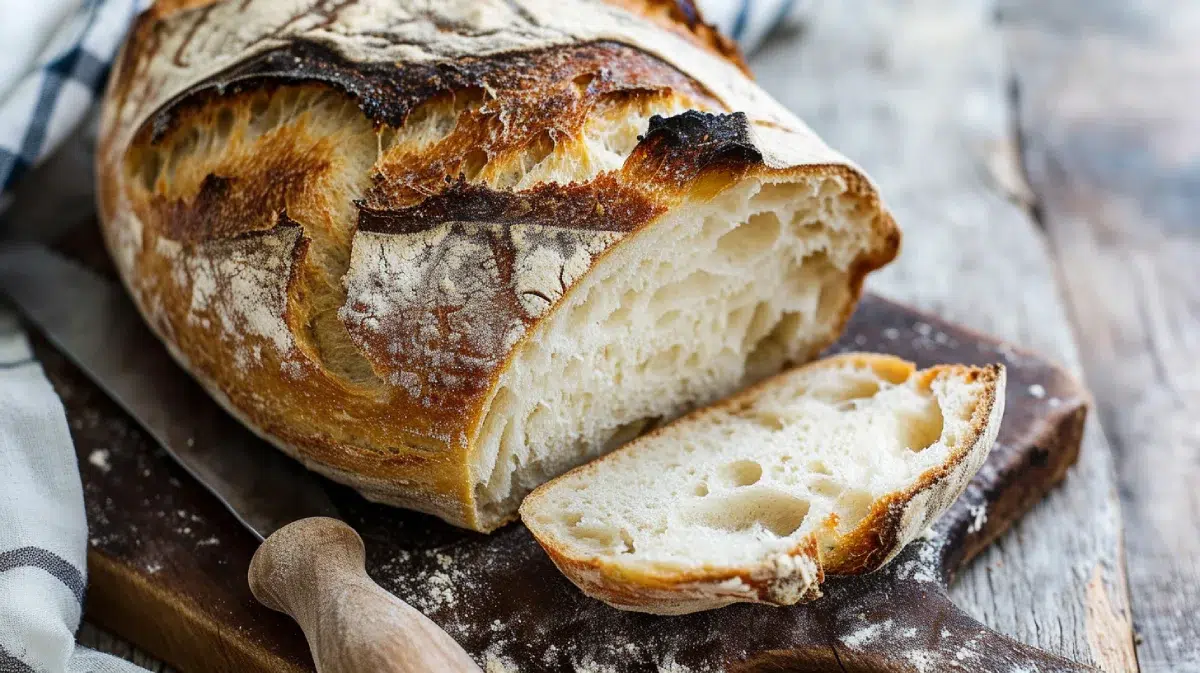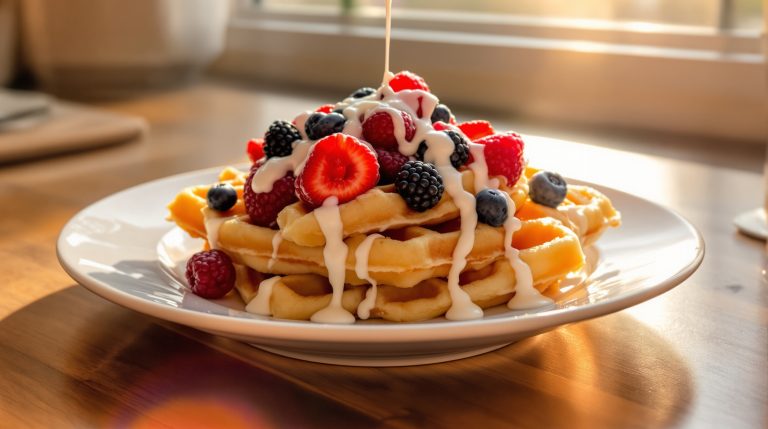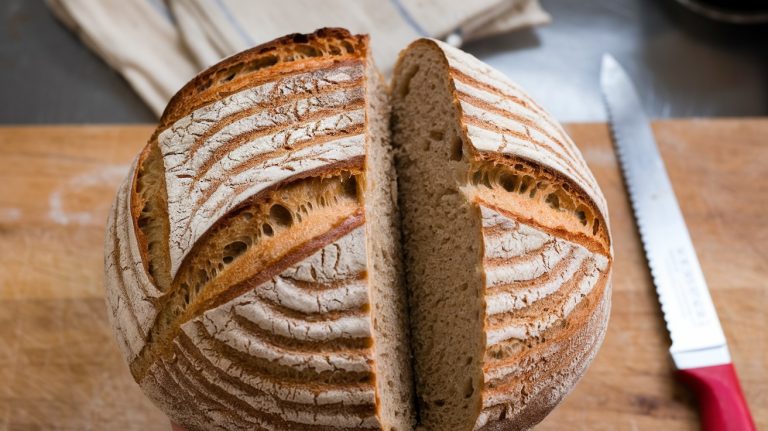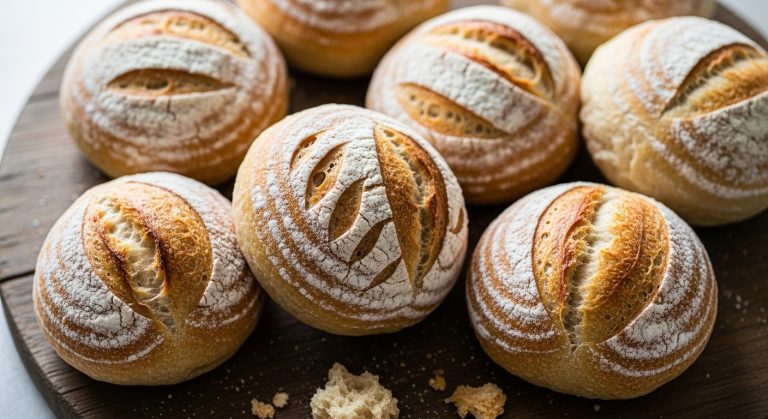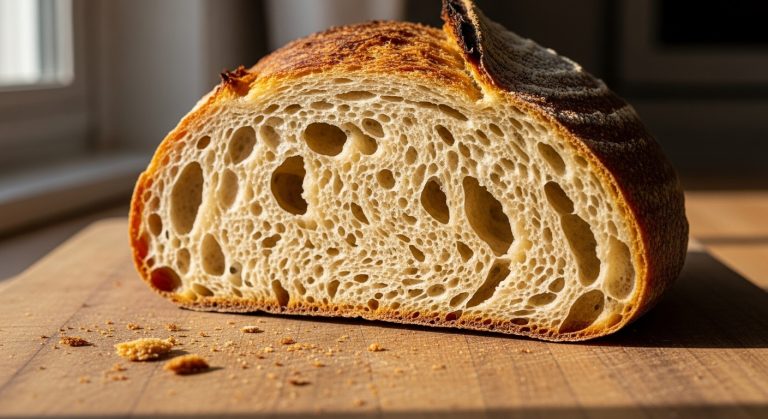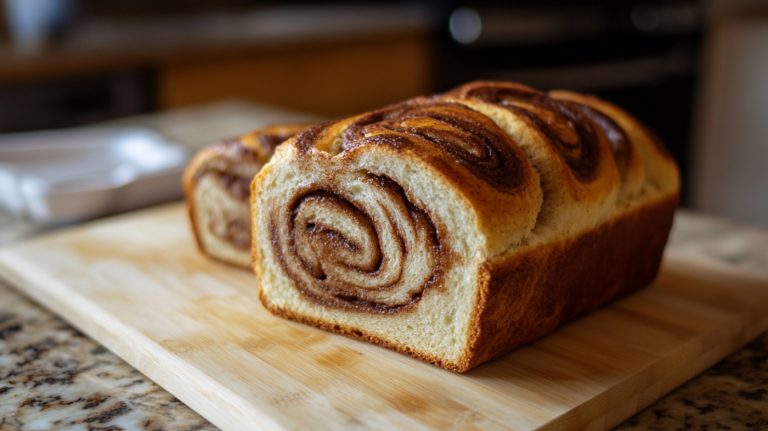Is Sourdough Bread Vegan? A Vegan’s Guide to This Classic Loaf
Have you ever wondered whether sourdough bread fits into your vegan lifestyle? Well, it’s not just you.
With its artisanal charm and unique tang, sourdough often gets much attention among vegans. See what we find by peeling back the layers of this topic.
It’s not just the taste that makes sourdough so appealing. There’s also curiosity about its compatibility with vegan principles.
Its texture and flavor set it apart from traditional baked goods. Fermentation, a process harnessing wild yeasts and lactobacillus bacteria, gives it its unique flavor.
Still, this process raises a question: could dairy be involved even in trace amounts? Sourdough seems perfect for vegans, as it’s usually just flour, water, salt, and sometimes yeast.
However, some sourdough variations have hidden non-vegan ingredients, like eggs, butter, milk, or honey. This calls for some investigative work; a closer look at ingredient lists is needed.
No worries, we’re here to help you learn about sourdough starters and identify hidden non-vegan additives. Let’s take a trip into the heart of sourdough bread, from its basics to its finer points.
Throughout the process, we’ll also discuss vegan sourdough’s health benefits, helping you decide if it belongs in your vegan diet. So, let’s begin this fun exploration together.
Veganism and Basic Bread Ingredients
Vegans abstain from eating animal products, including meat, fish, dairy, and eggs. They also don’t wear or use animal products like leather, wool, and silk.
Bread is versatile and can be used to eat sandwiches, soups, and salads, making it a staple in many vegan meals. Bread is also a great source of carbohydrates and fiber, making it ideal for vegans. It is also relatively inexpensive and convenient and a popular choice for vegans on the go.
The fact that some foods, including bread, contain animal products makes it difficult to tell whether they are vegan. While basic bread components like flour, water, salt, and yeast are vegan-friendly, some breads sneak in non-vegan items such as eggs, milk, or honey.
If you’re a vegan, choosing your bread wisely is crucial. So, what are vegan-friendly breads, and how can you tell?
Usually, it’s easy to tell if bread is vegan. Just look at the ingredients. If there are eggs, honey, royal jelly, gelatin, or dairy things like milk, butter, buttermilk, whey, or casein, it’s not vegan.
Be aware of some less obvious ingredients: Fats used to improve bread’s texture and moisture are often plant-based, like soybean oil. But occasionally, they can be from animal sources, including egg yolks.
For vegans who are strict about their diet, it’s best to choose bread labeled vegan or with an ingredient list you’re 100% sure of. Many breads are naturally vegan, but it’s always good to check the ingredients. Here are some common vegan-friendly breads:
- Sourdough
- Pita
- Ezekiel
- Ciabatta
- Baguette
- Focaccia
- Kosher Bread
Less processed breads are more likely to be vegan. Flatbreads and savory or dry breads are generally safe bets, while richer, fluffier breads like brioche often contain dairy or eggs.
There are exceptions, though, like Indian naan, which typically has milk or ghee, and Jewish challah, often made with eggs. So, checking the ingredient list is the most reliable way to ensure bread is vegan, as recipes can vary.
Evaluating Sourdough’s Vegan Status
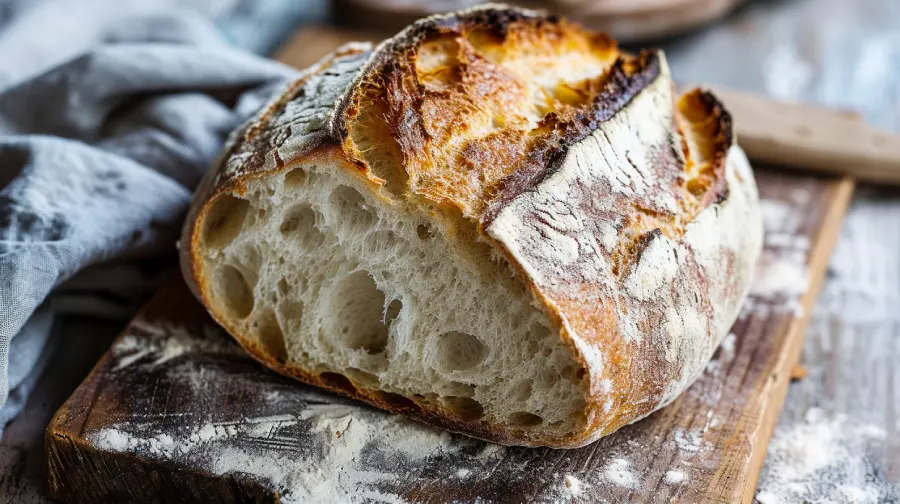
Sourdough bread is unique compared to other types of bread, mainly because of how it’s made. It uses a natural leavening process with a ‘starter’ – a mix of flour and water that captures wild yeast from the environment.
This process is what gives sourdough its well-known tangy taste and distinctive texture. But the question is, does this method make sourdough bread vegan?
At its core, with just flour, water, and salt, sourdough bread is indeed vegan. The fermentation of the dough, which includes naturally occurring yeasts and bacteria, breaks down the sugars in the flour. This helps the bread rise without commercial yeast and contributes to its unique flavor and chewy texture.
However, things can get more complicated regarding commercially produced sourdough. Some store-bought sourdough breads may include non-vegan ingredients like dairy, eggs, or honey.
So, to be sure that sourdough bread is vegan, it’s important to look closely at the starter used and any additional ingredients in the bread. This way, you can enjoy your sourdough, knowing it aligns with your vegan diet.
The Vegan Argument
Traditionally, sourdough bread has been considered vegan-friendly as it contains no animal-derived ingredients. However, recent discussions have highlighted a less obvious aspect: commercial yeast production.
Some manufacturers use nutrient sources like whey or eggs to produce baker’s yeast in large quantities. These ingredients feed the yeast during its production. Even if sourdough bread doesn’t directly contain animal products, it might indirectly contribute to animal exploitation through the commercial yeast used.
On the one hand, the natural fermentation process of traditional sourdough, which doesn’t require commercial yeast, is free from animal-derived products. Yet, when commercial yeast makes sourdough, it might indirectly support the dairy or egg industry.
Consuming sourdough bread as a vegan boils down to personal beliefs and interpretations of veganism. Some vegans might feel that the benefits of the fermentation process and the absence of direct animal products in sourdough outweigh the potential indirect harm. Others might avoid sourdough bread entirely, adhering strictly to their vegan principles.
Key Indicators of Vegan Sourdough Bread
Vegan sourdough bread incorporates vegan-friendly ingredients. Its fermentation process abstains from using any animal products, ensuring a vegan-friendly loaf of bread.
A vegan sourdough bread needs to be scrutinized to match plant-based dietary preferences. By omitting dairy and animal by-products, vegan sourdough bread recipes use simple ingredients that align with vegan principles.
Starting with a vegan sourdough starter made from flour and water, the bread remains free of non-vegan elements like eggs, honey, milk, or butter. Great vegan alternatives are available for any recipe that calls for non-vegan ingredients. Swap out any non-vegan recipe ingredients with plant-based alternatives like flaxseeds, almond milk, or vegan butter.
Flax or chia seeds work well as egg substitutes, various plant oils can effectively replace butter, and there’s a wide range of unsweetened plant milk to use instead of dairy milk. This approach ensures that the sourdough bread adheres to vegan dietary requirements.
Exploring the Variety of Vegan Sourdough Breads
Vegan sourdough bread is a delightful journey through various flavors and styles. The range expands with ingredients like olive oil and avocado oil, offering something unique for every palate.
From the heartiness of classic whole wheat to the sweet twist of cinnamon raisin, these breads are about great taste and the added nutrition they bring. It’s about finding joy in the variety, where there’s always a new flavor to try.
Classic Whole Wheat Sourdough
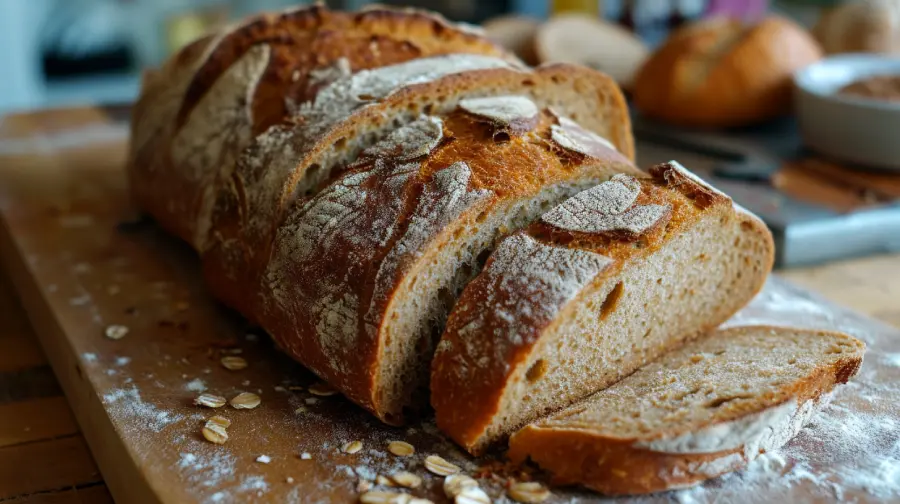
This bread is all about simplicity and wholesomeness. Made with whole wheat flour, water, and naturally occurring yeast, it’s a bread that feels as good as it tastes.
The fermentation process gives it a unique chewy texture and a hint of tanginess. It’s perfect for a hearty sandwich or to enjoy on its own, a staple for anyone who loves the goodness of sourdough with the added benefits of whole grains.
Olive and Rosemary Sourdough
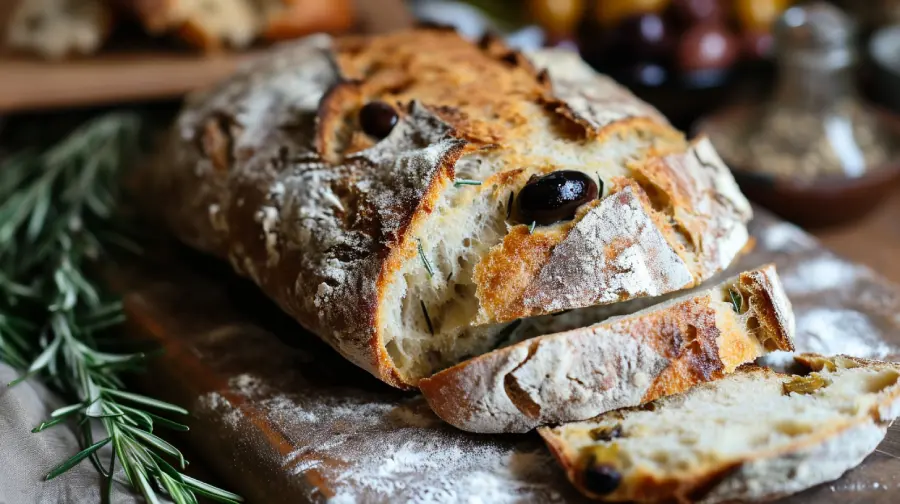
Here’s a bread that brings a little extra to the table. Infused with olive oil and rosemary flavors and made with simple, honest ingredients, it’s a bread that speaks of care and quality.
The fermentation at room temperature with a natural sourdough starter brings out a depth of flavor that commercial yeast just can’t match. Enjoy it with your favorite vegan spread, or savor it as is for a taste that’s both comforting and exciting.
Cinnamon Raisin Sourdough
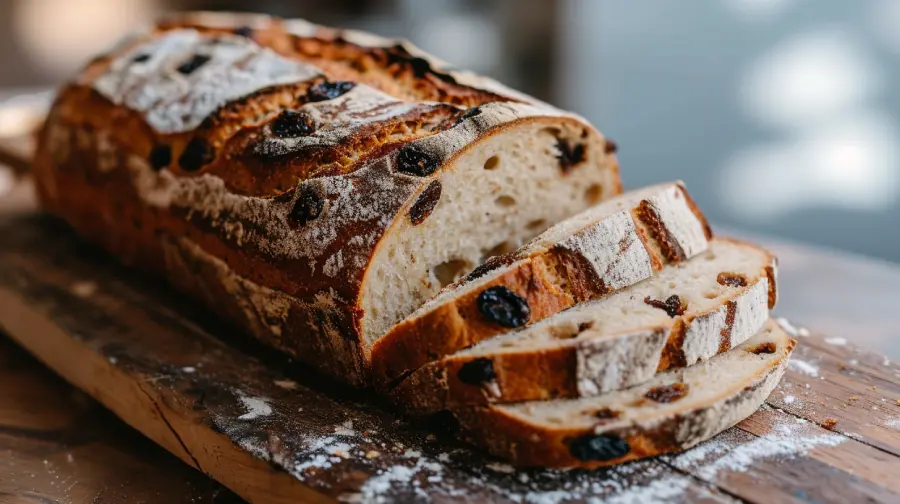
For those with a sweet tooth, this sourdough is a dream. Blending the warmth of cinnamon with the sweetness of raisins, it’s a bread that’s as perfect for a cozy vegan breakfast as it is for a dessert.
The fermentation makes it soft and fluffy, and it’s a guilt-free indulgence with vegan-friendly ingredients like maple syrup and coconut oil. Every slice celebrates how creative and satisfying vegan baking can be.
Seeded Multigrain Sourdough
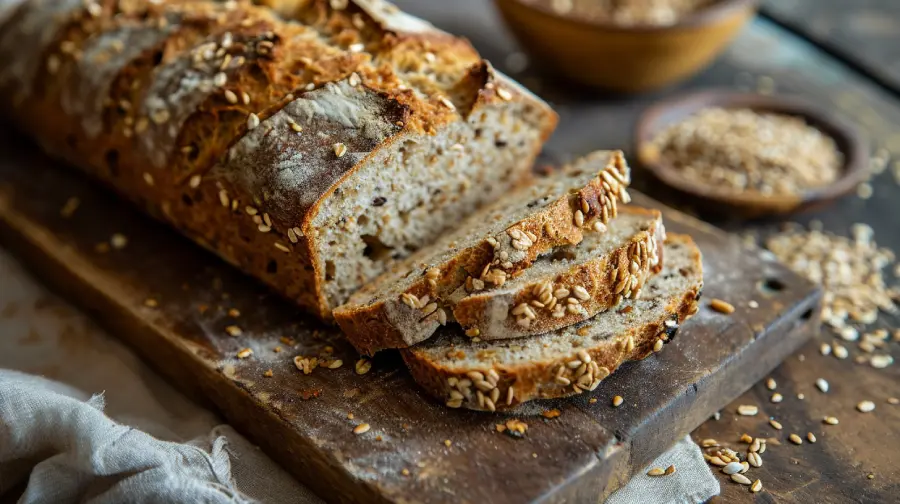
This variety is a treasure trove of textures and flavors. Packed with seeds like sunflower, flax, and pumpkin and a mix of grains, it offers a crunchy, nutty experience. Ideal for those who enjoy a hearty slice, this bread is delicious and packed with nutrients.
Spelt Sourdough
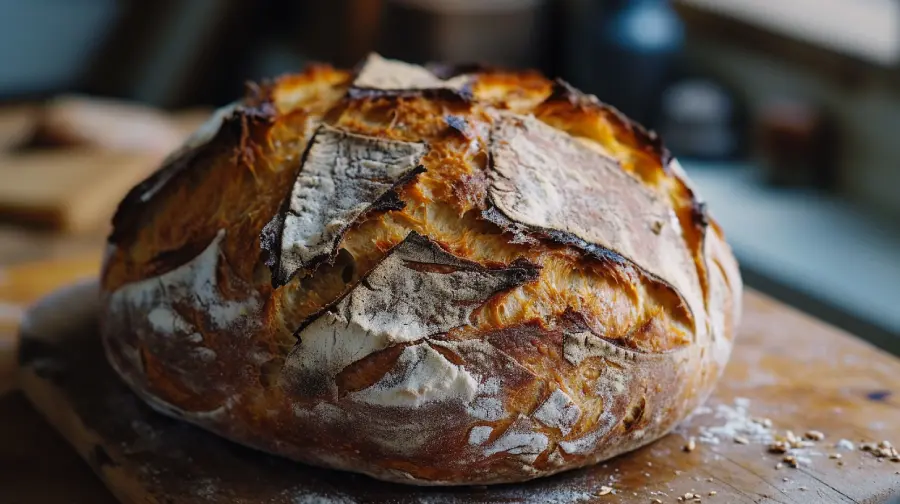
Spelt sourdough is for those who appreciate a slightly nuttier, sweeter flavor. Spelt flour, an ancient grain, gives this bread a delicate texture and a subtly sweet taste. It’s a great alternative for those looking to explore different types of grains in their vegan diet.
Rye Sourdough
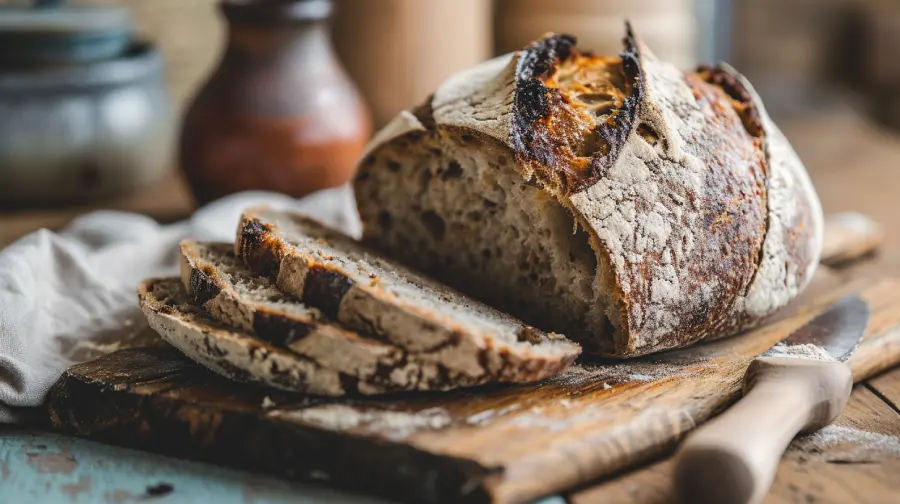
Rich and hearty, rye sourdough stands out with its deep, earthy flavors. It’s denser than your typical wheat bread, offering a distinctively robust taste. Perfect with savory toppings or as a base for a hearty vegan sandwich, rye sourdough is a staple for those who love stronger-flavored bread.
Fruit and Nut Sourdough
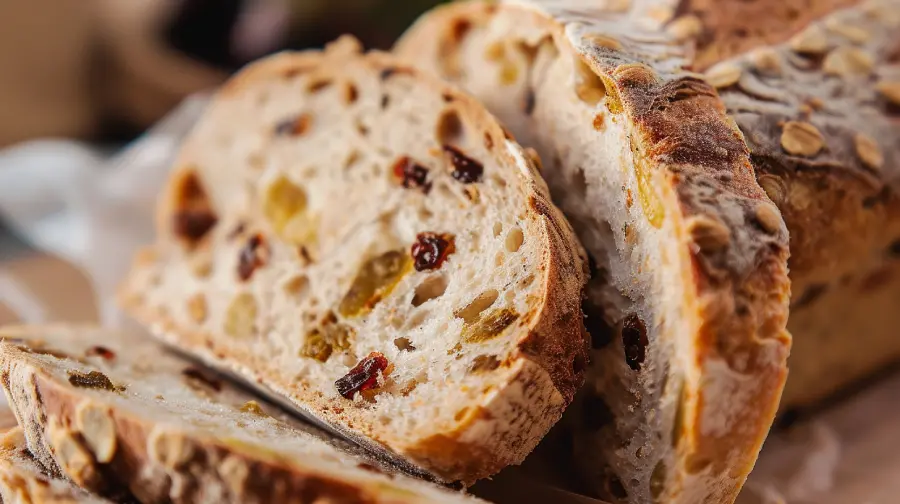
Imagine a bread that doubles as a treat: fruit and nut sourdough. Laden with dried fruits like apricots, cranberries, and nuts, this bread is a delightful mix of sweet and savory. It’s perfect for a special brunch or as an indulgent snack.
Sourdough’s Health Benefits in a Vegan Diet
Vegan sourdough bread is not just a delightful addition to a plant-based diet; it’s also packed with health benefits. This type of bread is a nutritional powerhouse for those committed to veganism or seeking healthier bread options.
A Digestive Aid and Nutrient-Rich Choice
One of the standout features of vegan sourdough bread is its positive impact on gut health. Thanks to the long fermentation process, the phytic acid content in the bread is reduced, which can aid digestion. This process also makes sourdough bread lower in gluten than other breads, making it a gentler option for the stomach.
Moreover, vegan sourdough contains essential nutrients like B vitamins, iron, and selenium. These are vital for various bodily functions, from energy production to immune system support. Compared to other breads, it has a lower glycemic index, meaning it causes a slower rise in blood sugar levels, making it a better choice for maintaining steady energy levels.
Nutritional Value from Whole Food Ingredients
When made with whole wheat flour, vegan sourdough bread becomes a great source of dietary fiber, essential for healthy digestion and keeping you full longer. The whole grains used in the bread contribute to its high nutrient content, offering a wholesome alternative to more processed bread varieties.
Since vegan sourdough bread excludes dairy and animal products, it’s also an excellent choice for those with certain allergies or dietary restrictions. By avoiding these common allergens, vegan sourdough bread ensures more people can enjoy its benefits without concern.
Tips to Buy Vegan Sourdough Bread
When hunting for vegan sourdough bread, a few smart strategies can ensure you make the right choice. Here’s what to keep in mind:
Stay Alert for Additives: Ingredients like mono and diglycerides, lecithin, or other emulsifiers in sourdough bread can be tricky. They’re sometimes derived from animal sources. Always give the ingredient list a thorough check.
Label Reading: Don’t just skim; read the labels on any sourdough bread you’re considering. Look for clear indications that it’s dairy-free and egg-free. If the label leaves you with questions, don’t hesitate to contact the manufacturer for a straight answer.
Ask Directly: When buying from a bakery or a specific manufacturer, get into the habit of asking about the ingredients. A quick conversation can confirm whether their sourdough bread is truly vegan.
Seek Out Vegan Bakeries: Check out local bakeries focusing on vegan products. They’re more likely to have various vegan sourdough options, and you might discover some new favorite breads.
Leverage Online Resources: Utilize online communities, vegan cooking blogs, and social media groups for recommendations. Often, the best tips come from fellow vegan enthusiasts who’ve done their research.
Diligence Pays Off: Making sure your bread is vegan takes effort, but sticking to your vegan principles is important. Always double-check before you buy to avoid any surprises.
Finding the perfect vegan sourdough might require some detective work, but it’s worth it for the peace of mind and delicious results.
A Simple Homemade Vegan Sourdough Recipe
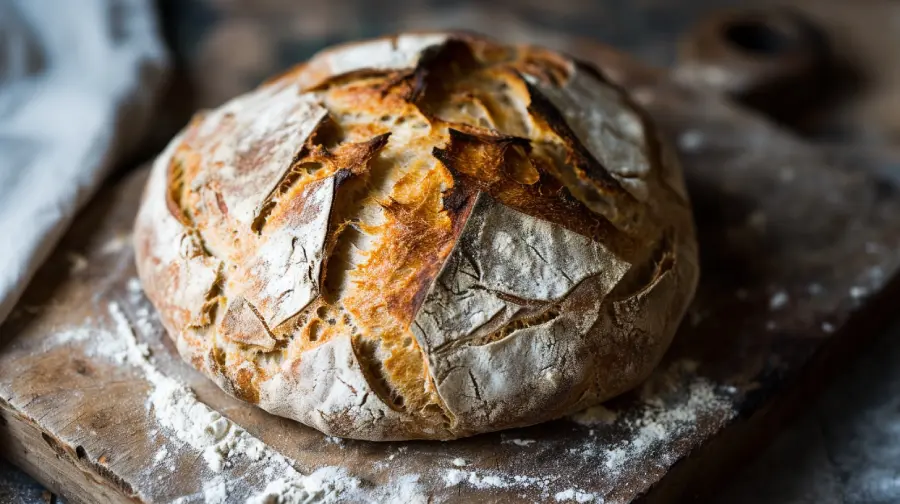
Want to bake your vegan sourdough? Here’s a straightforward recipe to get you started:
Ingredients:
- 1 cup vegan sourdough starter
- 3 cups bread flour
- 1 ½ cups water
- 1 tsp salt
Baking Instructions:
- Combine the starter, flour, and water. Rest the mixture for 30 minutes.
- Add salt, then knead until smooth.
- Let the dough rise for 8 hours in a warm place.
- Shape the dough, and rest for another hour.
- Bake in a preheated oven at 450°F (230°C) for 30 minutes or until golden brown.
I also have this incredible Vegan Sourdough Club Sandwich recipe perfect for a plant-based lunch. It’s become my go-to when I’m craving something satisfying and hearty.
Vegan Sandwich with Homemade Hummus
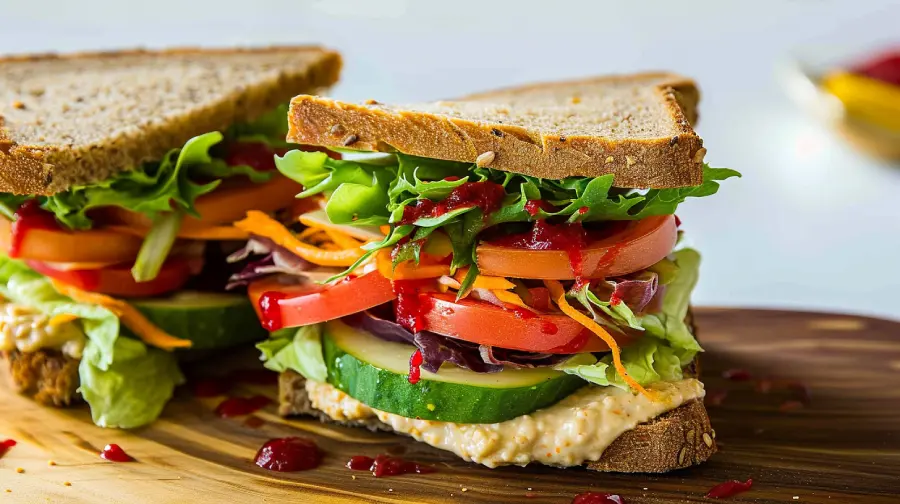
Servings: Just for me (or you!)
Calories: About 560 kcal
First up, let’s make a quick batch of homemade hummus:
Hummus Ingredients
- 1 can of chickpeas (drained and rinsed)
- 2 tbsp tahini
- 2 garlic cloves, minced
- Juice of 1 lemon
- 2 tbsp olive oil
- Salt to taste
- – A splash of water (for consistency)
- A pinch of cumin (optional)
Hummus Prep
- Blend the chickpeas, tahini, garlic, lemon juice, and olive oil until smooth in a food processor.
- Add a little water if it’s too thick—season with salt and cumin.
Now, for the Vegan Sandwich:
Ingredients
- 2 slices whole grain sourdough bread
- 2-3 tablespoon homemade hummus
- ⅓ cucumber
- 2 slices tomato
- Handful of alfalfa sprouts
- ¼ beetroot, grated
- 1 butter lettuce leaf
- ¼ avocado
- Salt and pepper to taste
Sandwich Instructions
- If you haven’t already, prepare the hummus following the steps above.
- Toast the sourdough bread slices.
- Spread hummus on one slice.
- Layer with cucumber, tomato, alfalfa sprouts, grated beetroot, and a lettuce leaf.
- Smash the avocado, season with salt and pepper, and spread it on the other slice of bread.
- Close the sandwich, slice it in half, and enjoy.
This combo of fresh, crunchy veggies and creamy homemade hummus makes for a super satisfying vegan sandwich. Perfect for a quick, nutritious lunch.
Nutrition Info:
It’s around 560 kcal and packed with 90g of carbs, 17g of protein, and 14g of fat. Plus, it’s loaded with fiber, vitamins, and minerals.
This sandwich is a real treat; it always leaves me feeling full and content. Plus, it’s so easy to whip up.
This sandwich is like a little celebration on a plate every time I make it. It’s so flavorful and bursting with textures. You’ve got to try this vegan treat.
Is Sourdough Bread OK for a Plant-Based Diet?
Sourdough bread can be a delightful addition to a plant-based diet. Its basic ingredients – flour, water, and salt – are naturally plant-based.
Traditional sourdough’s unique charm lies in its natural fermentation process, which doesn’t typically require animal-derived products. It offers a delicious taste and a simple, wholesome choice for those embracing a plant-based lifestyle. However, it’s always wise to double-check for any non-vegan additives, especially in commercially produced sourdough.
Is Yeast Vegan or Not?
Yeast is vegan. It’s a microscopic fungus, not an animal, and it plays a crucial role in bread making, including sourdough.
There are concerns about certain commercial yeast production methods that might use animal-derived nutrients. But yeast is a living organism that doesn’t come from animals or exploit them, making it suitable for a vegan diet.
For those particularly concerned about production processes, seeking out brands with clear vegan-friendly practices could offer peace of mind.
Is It OK to Eat Sourdough Bread Every Day?
Enjoying sourdough bread daily can be a joy, especially if you’re a bread lover. Sourdough is often easier to digest than other breads due to its fermentation process, and it’s rich in beneficial nutrients.
However, moderation is key, as with any food. Balance your diet with various foods to ensure you get a wide range of nutrients. And for those watching their gluten intake, remember that while sourdough is lower in gluten than some other breads, it’s not gluten-free.
Bringing It All Together: Vegan Life and Your Favorite Sourdough
Sourdough isn’t just any old bread; it’s like a beautiful blend of tradition, care, and a dash of creativity. It’s amazing how a simple loaf can tell such a rich story, right?
If you’re living the vegan life, sourdough can be your buddy. With a bit of attention to what’s in it and the labels, sourdough greatly fits right into your plant-based world. It’s all about choosing wisely.
I’ve discovered a variety of vegan sourdough out there, each with its personality. Whether craving something hearty or a bit on the sweet side, sourdough never disappoints. There’s always something new and exciting to try.
But hey, it’s not just about filling our bellies. Sourdough, to me, is about the joy and health it brings to our tables. It’s about sharing cozy stories with friends and family and keeping those lovely traditions alive.
So, how about you? Do you have any cool sourdough stories or recipes? I’m all ears! Let’s keep exploring this wonderful world of vegan sourdough together.

